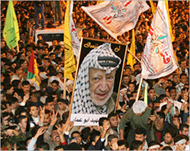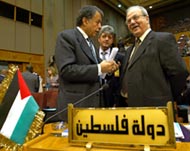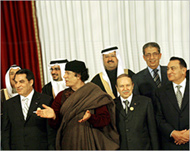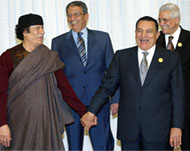Arab League: Reform or retire?
During its 60 years as an organisation founded on the principle of Arab common cause, the League of Arab States has slowly lost the lustre of a once golden era, analysts say.

Popularly known as the Arab League, the organisation was founded in 1945 on the premise of affording emerging Arab states – Iraq, Egypt, Syria, Lebanon, Jordan, Saudi Arabia and Yemen – political expression and economic and social cohesion.
In its formative years, the Arab League became involved in supporting independence movements against former colonial powers Great Britain and France.
In 1948, after failed pan-Arab attacks on the newly-formed State of Israel, the League shifted its focus to rejecting an Israeli presence in the Middle East and supporting Palestinian claims for nationhood.
In 1950, the Arab states signed a mutual defence treaty.
Although the League contributed to establishing a little-used Arab Common Market in the 1960s and attempted to facilitate inter-Arab trade, infighting has kept plans of an economic bloc far from being realised.
PLO created
In 1964, Egyptian President Gamal Abd al-Nasser convened the first meeting of Arab heads of state and tried to formulate a common Arab position regarding Israeli occupation of Palestinian land.
 |
|
The PLO, led by Yasir Arafat, was |
The 1964 summit also marked the creation of the Palestine Liberation Organisation (PLO) led by Yasir Arafat.
Despite the 1967 defeat of Arab countries to Israel, the League managued to unify a common Arab position, which would lead to the 1973 War. The war saw the eventual return of the Sinai Peninsula to Egypt.
The great divide
According to Mustafa Bakri, editor of the weekly political magazine Al-Osboa, the first signs of trouble in the League emerged when political events in the 1970s put its future as a viable entity in question.
 |
|
The Palestinian-Israeli conflict |
“The Arab League, since its beginning, has been weakened mainly by the 1979 Camp David peace treaty [between Egypt and Israel], which I think became the initiating point in Arab-Arab conflicts,” Bakri told Aljazeera.net.
The controversy regarding Egypt’s separate deal with Israel intensified. Eventually the league’s headquarters were moved from Cairo, Egypt, to the Tunisian capital of Tunis.
Egypt’s membership in the Arab League was suspended until 1990 when the headquarters were moved back to Cairo.
“The [1990] Iraqi invasion of Kuwait was another instance of the breakdown in the Arab world. The whole region went into a crisis that was reflected in the Arab League. The meetings since then have lost meaning,” Bakri added.
Non-binding resolve
Although most Arab League meetings and sessions conclude with a common communique or position on current affairs, there is no mechanism either to enforce these positions or to penalise Arab states that stray from the common resolve.
 |
|
The league urged Arabs not to |
The charter of the Arab League differs from the United Nations Security Council in that it leaves resolutions to be independently adopted and enforced by member states.
In 2002, the league reaffirmed that no member state should pursue normalisation of ties with Israel until the latter withdrew to borders in place before the 1967 war.
All 22 members of the league signed off on this resolution, but within weeks Mauritania initiated dialogue with Israel which led to the establishment of normal ties between the two countries.
Although Mauritania was condemned in certain quarters of the Arab media, its actions were not addressed in subsequent meetings despite being at odds with Arab League resolutions.
Lack of Arab will
Ali Abd al-Moneim Said, director of the Al-Ahram Centre for Strategic and Political Studies, says the problem of enforcement may lie in a lack of common Arab will-power.
“How can the Arab League take a leading role in the absence of Arab leaderships themselves?” he says.
|
“It is obvious that their last [Algiers] meeting didn’t reach any considerable decisions. The concluding statements contained mottos signifying nothing” |
Although some Arab League meetings have been plagued with walkouts and boycotts – one-third of leaders did not attend the Algiers Summit, for instance – Said believes the crux of the matter is how effective or not the attending leaders are in achieving results.
“Most regional organisations are built upon the coalition of the willing. The Arab League will not reach this synergy because the charter of the league of Arab states doesn’t include a clause for enacting resolutions reached by member states. This has to be done through the Arab states themselves.”
Al-Osboa’s Bakri agrees: “We are used to the Arab leaders making decisions which are not acted upon. It is obvious that their last [Algiers] meeting didn’t reach any considerable decisions. The concluding statements contained mottos signifying nothing.”
Reform or retire?
Recent years have seen growing momentum for the Arab League to reform its charter and its approach to handling regional conflicts, and play a greater role in international affairs.
 |
|
League initiatives for reform |
At the 2004 Tunis summit, member states pledged to initiate a mechanism that would reform the way league decisions are implemented.
The summit also promised the revitalisation of the Arab Common Market, creation of an Arab economic bloc, a security council, an Arab parliament and the establishment of an Arab Justice Court.
But the Tunis summit, which had initially been delayed by two months, ended without any concrete steps towards reform as infighting took its toll and Libya threatened to withdraw from the Arab League altogether.
The summit agreed on creating a follow-up committee tasked with supervising the implementation of proposals to reform the league. Discussion of the reforms was postponed to future Arab summits.
Hasan Abu Talib, editor-in-chief of the Arab Strategic Report (ASPSS), says Arab states are wary of reform because it would empower the Arab League and afford it measures to sanction or censure members who defy a resolution.
Empowering the League
“This kind of reform gives more power to the league, and lessens that of the state. The authoritative power of member states will gradually be minimised exactly as in the European Commission. This is not accepted in the Arab world,” Abu Talib told Aljazeera.net.
 |
|
One-third of Arab leaders did not |
“Reform of the Arab League depends mainly on how much commitment the Arab states are ready to give and how much power they will allocate the general secretariat of the Arab League. This kind of reform was disagreed on from the member states of the Arab league.”
Careful to avoid giving too much power to the secretariat, Algeria proposed a rotating seat for the secretary in late January 2005. The proposal was withdrawn after it threatened to divide the league into two camps.
No other substantial steps have been taken towards reform.
US pressure
Gamil Mattar of the Arab Centre for Development and Futuristic Research believes US pressure on the Arab League to support democratisation and human rights issues, and combat terrorism, will likely speed up the reform process.
“There is a growing feeling that the league should find itself a new role, if only to keep up with the continued external pressures placed on the Arab region. With every additional unit of pressure placed on Arab countries by the US, with every reluctant submission on our part, with every report or statement issued abroad about how horrible we – people and governments – are, the need for the league to do something becomes more urgent,” recently wrote in Al-Ahram Weekly.
There has also been US and EU pressure for the Arab League to recognise Israel, which was responded to with the 2002 Beirut initiative. Arab states would recognise Israel if it withdrew to borders prior to the 1967 war and allowed hundreds of thousands of Palestinian refugees to return to their homes.
Israel rejected the offer.
In 2005, the US again pressured the Arab League to recognise Israel.
In its closing communique at the recently-convened Algiers summit, the League re-affirmed its commitment to the Beirut initiative but rejected a Jordanian proposal that several key conditions, namely return to the 1967 borders, be dropped.
Financial crisis
Further plaguing the Arab League is a financial crisis prompted by the failure of member states to pay annual contributions – a system similar to the UN’s membership dues.
 |
|
Musa had threatened to resign if |
According to an Arab League report in 2004, member states were $100 million in arrears, leaving many staff members going months without pay and causing the cancellation of some 200 projects throughout the Arab world.
At the Algiers summit, the financial crisis was nearly overlooked, prompting reports of Secretary-General Amr Musa’s imminent resignation.
“The financial crisis is part of the dysfunction which renders the Arab League incapable of doing its job. The Arab leaders didn’t respond to pay some of their dues until Musa threatened to resign,” Bakri said.
Al-Ahram Centre’s Said believes the financial crisis in the league will likely impede efforts towards the organisation’s reform and expansion.
“We should first know our limits then plan our actions,” he said.
Optimism for reform
There are others who are inclined to take a more charitable view of the league’s record. Among them is Salah Montassir, a leading journalist at the Egyptian daily Al-Ahram, who does not believe the organisation should be disposed of.
Instead, he is optimistic that reforms may in future give the Arab organisation a more viable role to play.
|
“In the presence of the Arab League, the Palestine Liberation Organisation was established, the Iraqi-Kuwaiti crisis in 1960-61 was resolved peacefully” |
Ahmad Yusuf Ahmad, director of research at the Arab Studies Institute and a political science professor at Cairo University, says it is unfair to call the Arab League an inefficient organisation.
“In the presence of the Arab League, the Palestine Liberation Organisation was established and the Iraqi-Kuwaiti crisis in 1960-61 was resolved peacefully. A new set of organisations were integrated in the social and cultural fields. When it had a chance, achievements were recognised,” he told Aljazeera.net.
Arab disconnect
Even so, the Arab League may be running out of time in convincing the so-called Arab Street that it yet has a role to play.
Sulaiman Ahmad, a government employee in Cairo, says he has no clear understanding of why the Arab League exists.
“It never achieved anything that makes us say ‘yes’ we support the Arab League in this or that. Actually, I don’t follow sessions or resolutions,” he said.
Inas Awad, a school teacher said the league’s failure to prevent the invasion and occupation of Iraq made her doubt the organisation’s influence on current Arab issues.
“I used to think it is like a UN of the Arab world. Now I doubt it,” she said.